November 28, 2024 | 09:31 GMT +7
November 28, 2024 | 09:31 GMT +7
Hotline: 0913.378.918
November 28, 2024 | 09:31 GMT +7
Hotline: 0913.378.918
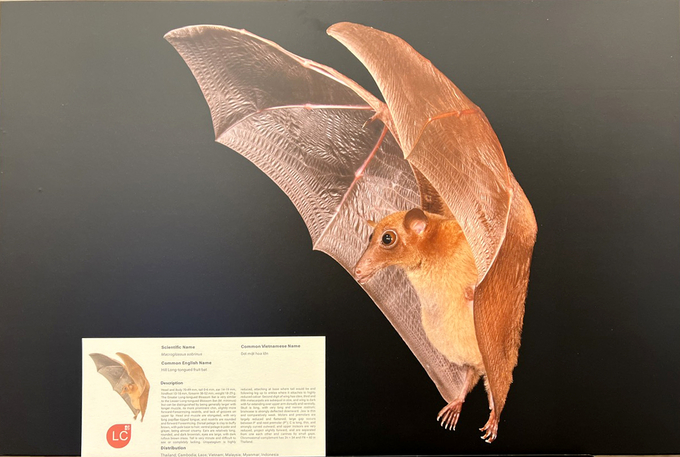
A photo of a bat species found in Vietnam, displayed at SEABCO 2024. Photo: Son Trang.
The 5th Southeast Asia Bat Conservation and Research Conference (SEABCO 2024) was held in Ho Chi Minh City on November 26th. This is the first time Vietnam has hosted an international conference on bat conservation.
SEABCO 2024 was co-organized by CIM Social Enterprise Co., Ltd. (CIM), the Center for Biodiversity and Endangered Species Conservation (CBES), and the Southeast Asia Bat Conservation and Research Unit (SEABCRU). The conference brought together over 120 scientists, conservation experts, and environmental activists from more than 20 countries around the world.
SEABCO is an important conference on bat research and conservation in Southeast Asia, first held in Thailand in 2007. SEABCO 2024 focused on four main topics. The first topic was Bat Ecology and Ecosystem Services: the role of bats in pollination, seed dispersal, and pest control. The next topic was Bat Conservation and Climate Change: strategies for protecting bat habitats in the context of climate change. The third topic was Evolution and Species Diversity: new studies on the taxonomy and ecosystems of Southeast Asian bats. The fourth topic was Diseases and Bats: the connection between bats and human health, along with disease prevention solutions.
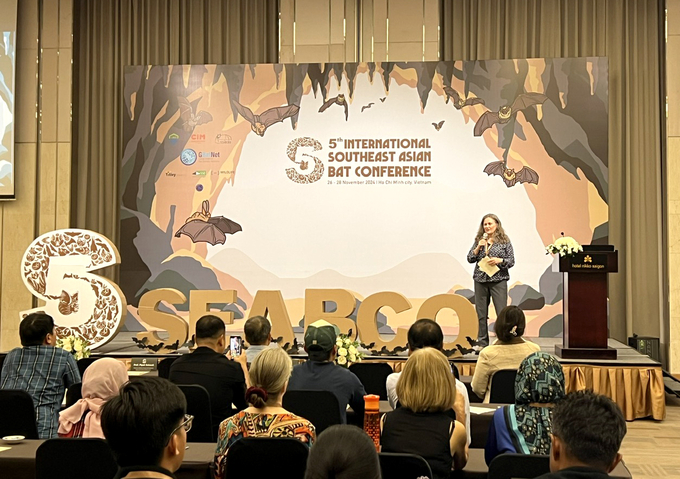
SEABCO 2024 attracts over 120 scientists, conservationists, and environmental activists. Photo: Son Trang.
Speaking at the conference, Professor Tigga Kingston from Texas Tech University (USA), Director of SEABCRU, shared "The 5th International Southeast Asian Bat Research and Conservation Conference is not only a platform for sharing cutting-edge scientific research but also an opportunity to emphasize the indispensable role of bats in ecosystems and human life. Through this conference, we aim to highlight the significant contributions of bats in maintaining ecological balance, supporting agriculture, and even advancing medicine. This is a moment for the international community to unite, exchange knowledge, and jointly develop effective conservation strategies to protect these silent heroes against current challenges. We believe SEABCO 2024 will be a pivotal step in raising global awareness of the importance of bats."
Ms. Truong Anh Tho, Director of CIM and Head of the SEABCO 2024 Organizing Committee, stated "As the host nation for SEABCO for the first time, we are proud to bring an event that is impactful not only scientifically but also for the community. SEABCO 2024 goes beyond being a scientific conference; it is an opportunity to promote Vietnam as a destination for nature conservation and sustainable development. We believe that through this event, Vietnam will not only contribute to bat and ecosystem conservation but also foster stronger connections with Southeast Asian countries and the global community. This is a journey to raise awareness and drive practical solutions that bring lasting value to our shared future."
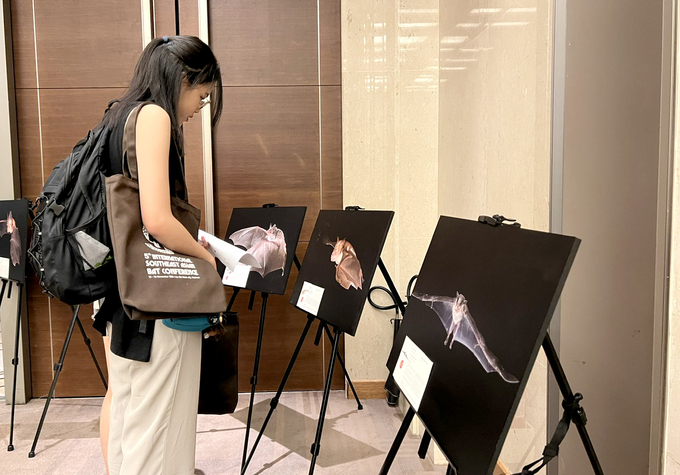
Attendees of the conference view photos of various bat species. Photo: Son Trang.
Currently, there are over 1,300 species of bats worldwide, accounting for about 20% of all mammal species. Bats are exceptionally unique animals and play a vital role in the ecosystem. They significantly contribute to controlling insects, particularly mosquitoes, and aid in seed dispersal, thereby supporting the growth of various plant species.
Bats have a considerable impact on agriculture and the preservation of natural environments. As natural "seed dispersers," they help regenerate forests and sustain the growth of many plant species. Insect-eating bats control pests, reducing the need for pesticides, which in turn protects the environment and public health.
It is estimated that the pest control services provided by bats in the United States are worth up to USD 53 billion annually. This highlights the importance of bats in maintaining ecological balance and supporting sustainable agriculture.
Bats not only benefit agriculture but also contribute to medicine. Research into their immune systems and compounds like "draculin" found in vampire bat saliva has led to advancements, such as treatments for reducing the risk of strokes. Additionally, bats are symbols of good fortune and prosperity in many cultures, particularly in Vietnam.
However, bats face numerous threats, including climate change, habitat loss, and unnecessary hunting and extermination. Therefore, conserving bats not only protects this species but also helps maintain the stability of ecosystems.
Bats (Chiroptera) are capable of flight thanks to their wings, which are formed from stretched skin, making them distinct from birds and insects. Bats possess an echolocation system, allowing them to navigate and hunt in the dark. They can also thrive in cave environments, forming large colonies with rich and unique behavioral patterns.
Translated by Kieu Chi
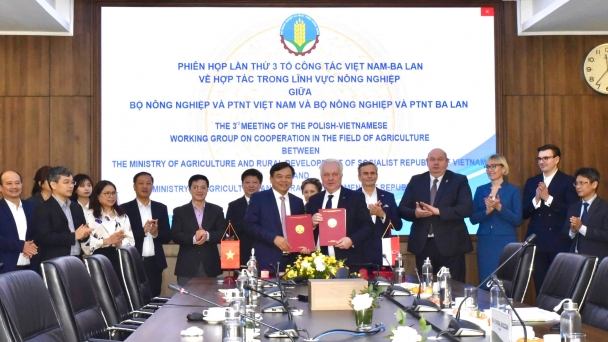
(VAN) Vietnamese MARD will cooperate closely with the Polish MARD to promote trade exchanges and achieve balance in bilateral relations.
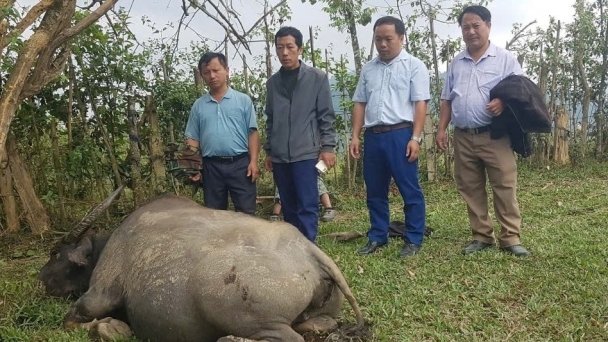
(VAN) Households in Huoi Mu village of Huoi Tu commune (Ky Son, Nghe An) are in a panic after buffaloes and cows suddenly die en masse.
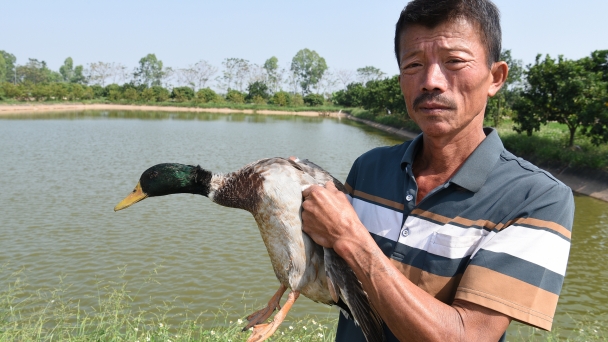
(VAN) The couple always raises 5,000 - 7,000 ducks, selling several hundred every day, not only throughout Hanoi but also the Central region.
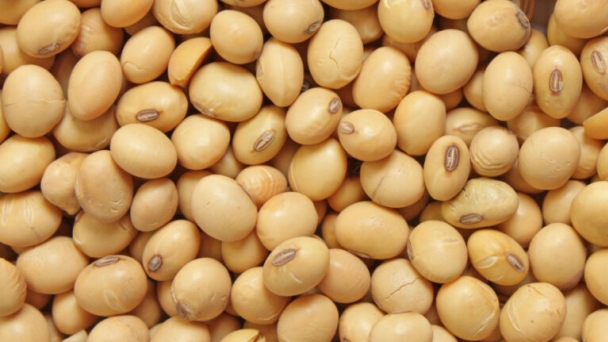
(VAN) Overcoming substantial resistance from environmental protection organisations, the Pakistani government has withdrawn a ban on GMO (genetically modified organism) soybean imports. The landmark decision is expected to aid the poultry sector.
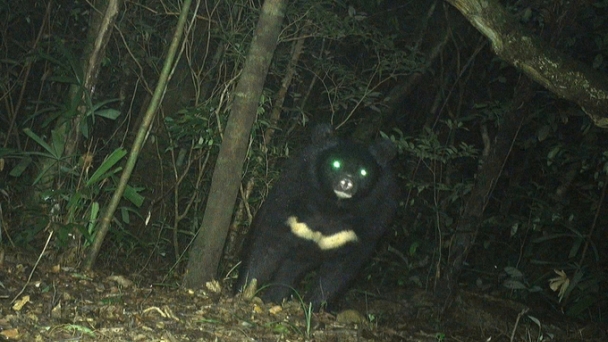
(VAN) An adult Asian black bear, weighing about 150kg, was discovered by camera traps at Bac Huong Hoa Nature Reserve, Quang Tri Province.
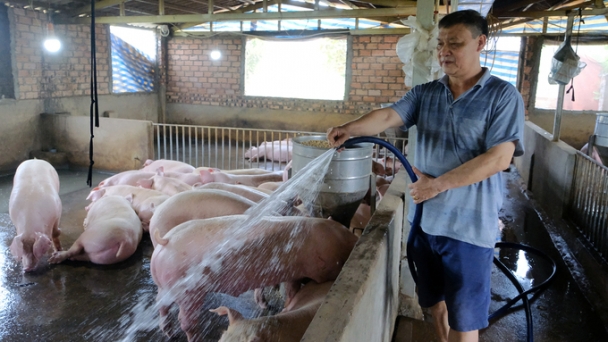
(VAN) Despite having commercial vaccine for African Swine Fever (ASF), experts agree that a comprehensive regional program is needed to address this issue.